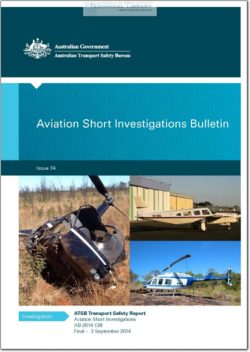ATSB-AB-2014-138

- Version
- 56 Downloads
- 4.06 MB File Size
- 1 File Count
- August 8, 2016 Create Date
- August 8, 2016 Last Updated
Aviation Short Investigation Bulletin - Issue 34

On 26 April 2014, a passenger checked in four bags for a Fiji Airways flight from Melbourne,
Victoria, to Nadi, Fiji, on a Boeing 737 aircraft, registered DQ-FJH. The passenger was a certified
remotely piloted aircraft (RPA) operator in Australia. The passenger stated during check-in that
there were no batteries in the checked bags, but declared 8 lithium batteries being carried as hand
luggage. The bags were screened in accordance with the Aviation Transport Security Regulations.
At about 2230 Eastern Standard Time (EST), the aircraft was at Gate D8 at Melbourne Airport and
the passengers’ bags were being loaded. The cabin crew members were on board preparing the
aircraft prior to boarding of passengers, and the first officer was in the cockpit conducting pre-flight
checks. The captain was on the tarmac, conducting an external inspection of the aircraft. A ground
engineer observed smoke emanating from the aft cargo hold, alerted the captain and notified the
aerodrome rescue and firefighting (ARFF) service. The captain saw white heavy smoke billowing
from the hold and immediately called the first officer to advise him. The first officer observed that
the aft cargo fire warning light was illuminated. The captain directed the first officer to activate the
aft cargo hold fire suppression system, shut down the auxiliary power unit and order an
evacuation of the aircraft. The first officer advised air traffic control and declared ‘Mayday’.1
The ARFF arrived and a smouldering hard-plastic case was removed to a safe location and
cooled with a fine water spray. The passenger who had checked in the case was located and was
asked whether any batteries were in it, to which the passenger responded there were none. The
ARFF and Australian Federal Police inspected all four of the bags checked in by the passenger
and found 19 batteries intact and additional 6-8 batteries that had been destroyed by fire.
An initial investigation revealed that several lithium-ion polymer batteries and an RPA controller
were contained in the case. An electrical short circuit involving the batteries resulted in the
initiation of a fire, destroying the contents and damaging the case (Figures 1, 2 and 3). An RPA
controller containing other, similar, lithium-ion polymer batteries was found in one of the
passenger’s other checked-in bags. The fire-damaged case had been screened through the
oversized luggage point at Melbourne Airport.
| File | Action |
|---|---|
| ATSB-AB-2014-138 Aviation Short Investigation Bulletin - Issue 34.pdf | Download |
Comment On This Post